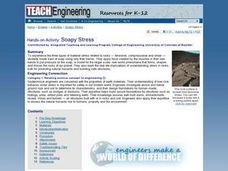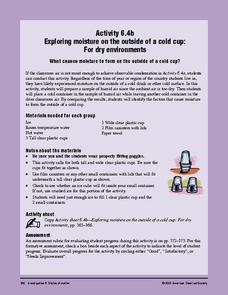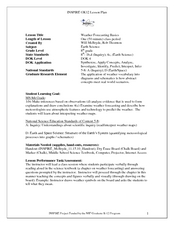Curated OER
Beyond The Earth Part I
Learners explore the solar system. In this space science lesson, students take notes on the solar system provided by their instructors. Learners then collaborate to design a computer-generated drawing of the solar system.
Curated OER
The Starry Night Time and Day Time
Second graders complete a unit of lessons on the solar system. They complete various art projects inspired by Van Gogh's 'Starry Night,' create a moon phases book, create a moon phase wind chime, develop a timeline of space exploration,...
Curated OER
Minerals
Students apply rules to compare and rank the hardness and softness of minerals. They perform a scratch test on four unknown mineral samples, read a bar graph that illustrates the comparative hardness and softness of four named minerals,...
Curated OER
Soapy Stress
Students investigate the three types of material stress related to rocks. They identify the three types of stress, conduct a simulation by breaking bars of soap using only their hands, and complete a worksheet.
Curated OER
Our Sky Clock
Students explore space science by completing a worksheet in class. In this astronomy lesson, students discuss and identify star patterns in the night sky and relate these patterns to the approximate time they appear. Students complete an...
Curated OER
Simulating the Greenhouse Effect in a Terrarium
Students identify what factors effect global warming and how the greenhouse effect occurs. In this environmental lesson students view videos then complete an experiment using a terrarium to observe greenhouse gas.
Curated OER
The First Conservationists
Students read a story. In this Native American lesson, students learn about Native Americans and their responsibility to take care of a place called Turtle Island. Students learn the vocabulary words generation, befall, interdependence...
Curated OER
The Color of Soil
Students are introduced to the Munsell System of Color Notation that is used for direct comparison of soils anywhere in the world. They become familiar with hue, value and chroma notations, identify colors that act as clues to the...
Curated OER
Identifying Sea Ice
Students study different types of sea ice and interview an Yupik elder or local hunter. In this sea ice lesson, students study the native language for sea ice terms. They interview an elder from Alaska's northern coast about their...
Curated OER
Handling the Earth with Care
Eighth graders examine the characteristics of caring people. In this behavioral studies lesson, 8th graders differentiate between caring and uncaring personality traits. Students view a video about personality traits, and work in...
Curated OER
Space Age Technology Comes to Earth
Students explore jobs related to agriculture. In this technology/agriculture lesson, students recognize the importance of natural resources and agriculture on the use of Range Rambler software. Students complete an experiment and a...
University of Colorado
Astro-Chronology
Class members play a version of the game Chronology to determine when certain scientific events occurred in history. Teams play until someone has 5-10 events in the correct order.
Prairie Public Broadcasting
Egyptian Pyramids Virtual Field Trip!
A virtual field trip takes enthusiastic travelers to the pyramids of Giza. Using Google, scholars explore the grounds of the ancient pyramids found in Egypt then complete three worksheets: a photo analysis page, a reflection sheet, and a...
Chicago Botanic Garden
Are Global CO2 Levels Changing?
According to the Mauna Loa observatory, carbon dioxide levels increased by 3 ppm in our atmosphere between 2015–2016. Individuals analyze carbon dioxide data from around the world and then share this with a home group in lesson three of...
Sunburst Visual Media
Clouds
Support science instruction with a combination of engaging activities and skills-based worksheets that focus on clouds. Learners take part in grand discussions, write an acrostic poem, complete graphic organizers, solve word puzzles, and...
NOAA
Mud is Mud...or is it?
We know that the type of soil varies by location, but does the seafloor sediment also vary, or is it all the same? Scholars compare photos of the seafloor from two different locations: the Savannah Scarp and the Charleston Bump. Through...
NOAA
I Can't Breathe!
The Gulf of Mexico dead zone, an area of low oxygen that kills marine life, costs the United States $82 million every year. Young scientists research anoxic ocean environments then come up with a hypothesis for the cause of the Gulf of...
NASA
Stellar Fingerprints and Doppler Red Shifts
Young scientists observe the spectra of elements and compare that to the Doppler effect. Hook scholars from the beginning all the way to the extension activities in this 5E-format lesson.
American Chemical Society
Exploring Moisture on the Outside of a Cold Cup: For Dry Environments
If the area you live in is arid, or the preceding experiment in this unit didn't yield obvious results, use this one in place of it to help reveal where condensation comes from. The mini unit that this is part of a comprehensive...
Curated OER
Continental Drift
Pupils simulate convection waves using a model. In this earth science instructional activity, students explain the effect of plate movements to Earth's geography. They use the internet to find answers to graphic organizer questions.
Curated OER
Ocean Floor
Students identify ocean floor features. In this earth science lesson, students predict the object inside a close box to make them realize the difficulties scientists faced then. They label the different zones of the ocean floor after the...
Curated OER
Global Warming – More or Less
Eighth graders identify the factors that contribute to global warming. In this earth science lesson, 8th graders evaluate the impact of global warming on the planet. They discuss their views within the group.
Curated OER
Weather Forecasting Basics
Eighth graders analyze weather diagrams and weather maps. In this earth science lesson, 8th graders explain why it is important to know the weather. They complete a handout at the end of the lesson.
Curated OER
Soil Layers
Ninth graders identify the different layers of soil. In this earth science lesson, 9th graders explain how limestone layers are formed. They identify the different parts of the coral colony.

























